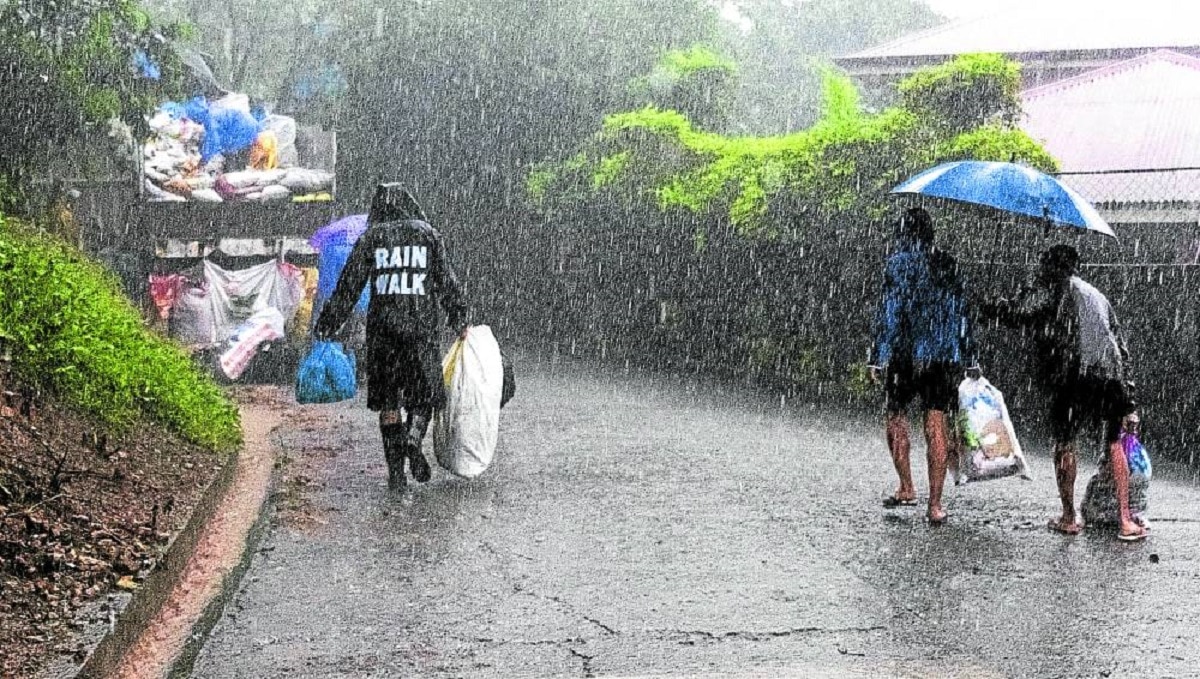
TRASH DAY | Baguio residents are given scheduled days each week to bring out their trash, rain or shine, to be picked up by waste collectors even in remote villages. The city’s garbage would have fueled a waste-to-energy plant being developed in Benguet but the local government says it will scrap the projects due to the technology’s environmental impact. —NEIL CLARK ONGCHANGCO
BAGUIO CITY, Benguet, Philippines — The local government will no longer push through with its waste-to-energy projects, Mayor Benjamin Magalong said at a Wednesday zero-waste forum that denounced the technology’s potential harm to the environment.
Baguio waste managers would instead focus on reducing the city’s daily trash, Magalong told students and environmental activists who listened to zero-waste expert Jorge Emmanuel’s lecture on dioxins and furans.
These are extremely toxic byproducts of incinerators and the most advanced thermal power plants in Europe, said Emmanuel, a chemical engineer who is a global consultant on waste management and who serves as an adjunct environmental science professor for graduate studies at Silliman University.
Magalong said he entertained waste-to-energy technology as a primary solution to Baguio’s garbage problem, “but after listening to you (Emmanuel), I would like to officially declare that the city of Baguio will be abandoning its waste-to-energy [options],” drawing cheers from students at the University of the Cordilleras, which hosted the forum.
The city has been spending over P200 million annually to ship its trash to commercial landfills, but it could spend much more should the government close the ecological sanitary landfill in Capas, Tarlac, by the end of the year.
Each day, about 550 metric tons of trash are produced by a population of under 400,000, coupled with waste left by tourists.
Toward the end of 2023, Magalong signed a memorandum of agreement (MOA) with Metro Global Holdings Corp., a company owned by businessman Robert John Sobrepeña, which is developing a 15-megawatt waste-to-energy plant in neighboring Sablan town in Benguet province.
Feedstock contract
The agreement commits most of Baguio’s garbage to the power plant once it is built under a feedstock contract that may now need to be withdrawn after Magalong’s pronouncement.
The facility would also absorb trash produced by the Benguet towns of La Trinidad, Itogon, Sablan, Tuba and Tublay. Together with Baguio and Sablan, these communities make up the BLISTT metropolis. Magalong did not explain how he could unilaterally break the existing MOA with his declaration at Wednesday’s forum.
READ: Waste-to-energy plant rising in Benguet using Baguio’s garbage
In an interview on Thursday, Councilor Betty Lourdes Tabanda, chair of the health and environment committee, said the city council would review the deal.
When he first assumed office in 2019, Magalong negotiated a waste-to-energy project pitched by Japanese engineering firm Toyo Energy Solution Co. Ltd., but talks failed to resolve the high tariff that would need to be shouldered by residents.
In the same year, zero-waste proponent Paul Connett, author of the book “Zero Waste Solution,” described waste-to-energy as a “lazy” political solution during a talk he gave at City Hall.
Original goal
According to Connett, the business model for generating power using waste shows that the value of the electricity produced does not make up for the expenses for the medical treatment of people, as well as the inevitable cleanup of the surrounding environment.
On Wednesday, Emmanuel said the radius of the dioxin impact of a Sablan waste-to-energy plant could be 10 kilometers and may reach other Benguet towns and La Union province.
Tabanda said on Thursday she had reservations about Metro Global’s waste-to-energy project because it would disrupt Baguio’s original goal of minimizing garbage set by a now outdated solid waste master plan.
Instead, households and businesses would generate more waste to fuel the power plant, she said on the sidelines of a public consultation on amendments to the city’s 2017 ordinance banning plastics. Removing plastics, which make up 80 percent of Baguio’s residual waste, would contribute to the reduction of trash sent to landfills.Among the proposed changes is a city-wide ban on the sale or use of single-use plastics like “sando bags,” straws and fast food utensils, which is enforced by an executive order issued by Magalong.
Tabanda said the amendments might include a pollution fee of P5 per item in cases where businesses have no locally manufactured and cost-effective alternatives in the market.
Eugene Buyuccan, the city government’s general services officer, said Magalong instructed him to fast-track a city-wide materials recovery program, beginning with four pilot barangays.
Junkshops would be tapped to separate trash that could be resold, as well as recyclers who could convert and “reuse” other items thrown in bins, said Buyuccan. The city, he said, is now investing in equipment like shredders and glass crushers so a smaller amount of waste is sent to landfills.